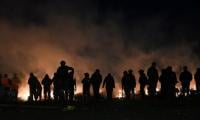The idea of politics
Until the late 1980s, the inter-paradigm debate in the international relations (IR) theory largely focused on the distribution of material power in terms of military strength and economic capabilities.
States were considered the most powerful actors in the international system by both neo-realists and neo-liberals. While divergent in nature, both the liberal and realist schools of thought agreed that anarchy was inherent in the international system. In addition, the lack of a central authority was keenly felt by both paradigms because it encouraged states to generate a self-help system and act unilaterally.
Anarchy – the central fact of the international system – is derived from the view that the absence of an overarching legitimate global authority in the Westphalian nation-state system leaves states with no option but to resort to war to resolve their mutual disputes. As a result, scholars agreed that anarchy was the single most important characteristic underlying international politics and any understanding of global politics must flow from an understanding of the anarchic international structure.
However, in the early 1990s, the constructivist approach emerged as a challenge to the state-centric paradigms and resulted in an overwhelming focus on the material aspects of the structure of the international system. Constructivist scholars, who emphasised the social construction of reality, argued that the world is not objective. In their view, the variables of interest to IR scholars – such as military power, international institutions – are important not because they are objective facts, but because of their social meanings. For example, the nuclear weapons of France and India are probably equally destructive, but have very different meanings for the outside world.
Constructivists contend that the intersubjectively shared ideas are as important as military capabilities in any empirical analysis. Realists emphasise the role of the balance of power in global politics to minimise the possibility of future wars. While the theoretical approach rests on the idea that security is enhanced with an equitable distribution of military capabilities among nations, the equilibrium of power among all major powers in the world is generally difficult to achieve. Subsequently, states resort to employing different tactics to sustain the balance of power and achieve their desired strategic goals.
However, constructivist scholars argued that power and anarchy do not define whether the international system is peaceful or conflictual at a particular point in time. Instead, it is a function of the shared culture created through discursive social practices.
In the constructivist account, social meanings are constructed from a complex mix of history, norms and the way different leaders understand state behaviour. This is very important because if constructivist scholars are correct, states do not have to worry about relative power and security dilemmas. International politics should be guided by shared values and intersubjective norms held by both state and non-state actors. The focus on the intersubjective dimensions of knowledge makes the structure of the international system look like a causal force because of the proposed role of values as an ideational structure determining the strategic behaviour of states.
In a socially constructed world, this ideational structure has both a constitutive and regulative effect on all actors in the international system because the evolved structure of the international system makes states redefine their identities and interests through a process of social interaction. Unlike realist and liberal theorists, constructivists do not hold identities and interests as constants to understand how the ideational structure determines the way all actors identify their position and interests in the international system.
This leads to an interesting question about the ‘agent-structure problem’ in international relations theory. Realist scholars define the international structure in terms of the observable attributes of states as primary actors and how the structure constrains the choices of state actors. On the other hand, constructivists believe that both actors and structures co-determine and even constitute each other. In their view, ideational structures constrain the behaviour of actors in terms of their identities and interests. But these ideational structures are also created through the discursive practices of agents.
We cannot treat identity and interests as a given because they also keep changing with the passage of time. As a result, state sovereignty should also be considered a social construct. And there are no objective threats because they are always socially constructed.
Constructivists also highlight how the nature of global politics has changed because of the role that norms play in the equation. Norms are collective beliefs that regulate the behaviour and identity of all actors on the world stage. The structure of the international system is actually a human intellectual creation and it can be changed by introducing new norms.
Even powerful states follow norms and international obligations because they are concerned about their outlook. Norms also strongly influence the way states think about their own security practices. Countries acquire nuclear weapons not because they face genuine security threats, but because building nuclear weapons is a means to gain prestige.
The constructivist approach explains the complex political socialisation process involved in redefining the identities and interests of actors. However, some quantitative scholars argue that concepts like identities and interests cannot be studied through positivist approaches. There is an element of subjectivity inherent in these concepts because they are relative to different states, institutions and communities. Another critique is that norms exist but are often violated by major powers. Despite this criticism, the idea of politics as a social construction continues to attract significant scholarly research in American academia.
Email: rizwanasghar5@unm.edu
-
 'Bridgerton' Season 4: Showrunner Talks About Violet's Steamy Romance
'Bridgerton' Season 4: Showrunner Talks About Violet's Steamy Romance -
 John Tesh Recalls ‘uncomfortable’ Backlash Over ’70s Romance With Oprah Winfrey
John Tesh Recalls ‘uncomfortable’ Backlash Over ’70s Romance With Oprah Winfrey -
 Meghan Markle, Prince Harry Problem Was Not ‘work’ During Time With Royals
Meghan Markle, Prince Harry Problem Was Not ‘work’ During Time With Royals -
 Meta Strikes Multi-billion-dollar AI Chip Deal With Google: Will The New Collaboration Pay Off?
Meta Strikes Multi-billion-dollar AI Chip Deal With Google: Will The New Collaboration Pay Off? -
 Gracie Abrams Breaks Silence After Losing 2026 BRIT Award
Gracie Abrams Breaks Silence After Losing 2026 BRIT Award -
 Deon Cole Takes Swipe At Nicki Minaj In Mock Prayer During NAACP Image Awards Monologue
Deon Cole Takes Swipe At Nicki Minaj In Mock Prayer During NAACP Image Awards Monologue -
 Jennifer Garner Reveals The Actress Who 'carried Through Things'
Jennifer Garner Reveals The Actress Who 'carried Through Things' -
 Shamed Andrew ‘awful’ Time As Trade Envoy Is Laid Bare By Insider
Shamed Andrew ‘awful’ Time As Trade Envoy Is Laid Bare By Insider -
 Belgium Seizes Suspected Russian Shadow Fleet Tanker
Belgium Seizes Suspected Russian Shadow Fleet Tanker -
 Liza Minelli Makes Bombshell Claim About Late Mother Judy Garland’s Struggle With Drugs
Liza Minelli Makes Bombshell Claim About Late Mother Judy Garland’s Struggle With Drugs -
 Shipping Giant Maersk Halts Suez Canal, Bab El-Mandeb Sailings Amid Escalating Conflict
Shipping Giant Maersk Halts Suez Canal, Bab El-Mandeb Sailings Amid Escalating Conflict -
 Matthew McCoughaney Reveals One 'gift' He Achieved With Losing Nearly 50 Pounds
Matthew McCoughaney Reveals One 'gift' He Achieved With Losing Nearly 50 Pounds -
 'Scream 7' Breaks Box Office Record Of Slasher Franchise: 'We Are Grateful'
'Scream 7' Breaks Box Office Record Of Slasher Franchise: 'We Are Grateful' -
 Bolivian Military Plane Crash Death Toll Rises To 20
Bolivian Military Plane Crash Death Toll Rises To 20 -
 'Sinners' Star Blasts Major Media Company For 2026 BAFTAs Incident
'Sinners' Star Blasts Major Media Company For 2026 BAFTAs Incident -
 Inside Scooter Braun, Sydney Sweeney's Plans To Settle Down, Have A Baby
Inside Scooter Braun, Sydney Sweeney's Plans To Settle Down, Have A Baby



